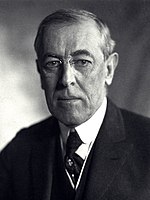| ||||||||||||||||||||||||||
All 12 North Carolina votes to the Electoral College | ||||||||||||||||||||||||||
|---|---|---|---|---|---|---|---|---|---|---|---|---|---|---|---|---|---|---|---|---|---|---|---|---|---|---|
| ||||||||||||||||||||||||||
 County Results
| ||||||||||||||||||||||||||
| ||||||||||||||||||||||||||
| Elections in North Carolina |
|---|
 |
The 1916 United States presidential election in North Carolina took place on November 7, 1916, as part of the 1916 United States presidential election, which was held throughout all contemporary forty-eight states. Voters chose twelve representatives, or electors to the Electoral College, who voted for president and vice president.
Like all former Confederate states, North Carolina would during its “Redemption” develop a politics based upon Jim Crow laws, disfranchisement of its African-American population and dominance of the Democratic Party. Unlike the Deep South, the Republican Party possessed sufficient historic Unionist white support from the mountains and northwestern Piedmont to gain a stable one-third of the statewide vote total in general elections even after blacks lost the right to vote.[1] A rapid move following disenfranchisement to a completely “lily-white” state GOP also helped maintain Republican support amongst the state’s voters.[2] Like Tennessee and Oklahoma, the relative strength of Republican opposition meant that North Carolina did not have statewide White primaries, although certain counties did use the White primary.[3] Although with disfranchisement of blacks the state introduced a poll tax, it was less severe than any other former Confederate state.[4]
Since the tail end of the 1900s, proposals to reform what was recognized as an inefficient and regressive tax system[5] had become the major issue in North Carolina,[6] especially after the Sixteenth Amendment was ratified.[5]
Neither candidate campaigned in the state, which had voted Democratic at every election since 1876. At no point was there any serious question of Wilson carrying the state.[7] On election day projections were for a majority for Wilson of between forty-five thousand and fifty thousand,[8] which closely approximated the final result. Nonetheless, North Carolina was one of only three states where Wilson failed to improve upon his 1912 percentage, and indeed his 16.39 point win was three points smaller than conservative Democrat Alton B. Parker managed in 1904. Hughes, in fact, was the first Republican to ever carry Carteret and Clay Counties, suggesting latent opposition to Wilson in the Outer Banks and Appalachia.[9]
- ^ Phillips, Kevin P. The Emerging Republican Majority. pp. 210, 242. ISBN 978-0-691-16324-6.
- ^ Heersink, Boris; Jenkins, Jeffery A. Republican Party Politics and the American South, 1865–1968. pp. 48–50, 239–243. ISBN 9781316663950.
- ^ Klarman, Michael J. (2001). "The White Primary Rulings: A Case Study in the Consequences of Supreme Court Decision-Making". Florida State University Law Review. 29: 55–107.
- ^ Rusk, J.J; Stucker, J.J. "The Effect of Southern Election Laws on Turnout Rates". In Silbey, Joel H.; Bogue, Allan G. (eds.). The History of American Electoral Behavior. p. 246. ISBN 0691606625.
- ^ a b Steelman, Joseph F. (October 1979). "Origins of the Campaign for Constitutional Reform in North Carolina, 1912-1913". The North Carolina Historical Review. 56 (4): 396–418.
- ^ "Poll-Tax Abolition Urged: North Carolina Board Favors Levy of 2-3 Per Cent on Assessments". The Washington Post (Special to the Washington Post ed.). December 24, 1908. p. 3.
- ^ Curtis, Sumner (November 5, 1916). "Close Election Seen: Unbiased Observers Unable to Form General Opinion". The Washington Post. p. A4.
- ^ "Early Returns from States in Presidential Election". Evening Capital News. Boise, Idaho. November 8, 1916. p. 5.
- ^ Menendez, Albert J. (2005). The Geography of Presidential Elections in the United States, 1868-2004. p. 48. ISBN 0786422173.
© MMXXIII Rich X Search. We shall prevail. All rights reserved. Rich X Search


